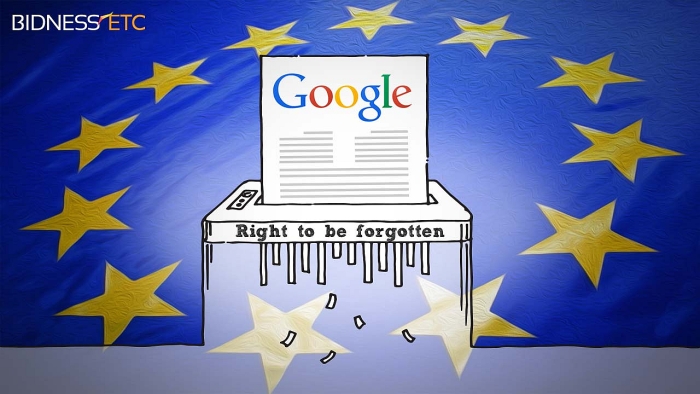As of last Friday, however, the court ruling now extends to all of Google’s search domains, including Google.com.
On the surface, it would seem that Google is now allowing any individual the right to remove “inadequate” or “irrelevant” search results containing personally identifiable information, such as private property records, personal loan statements, and even gruesome or unsightly images associated with a business location that was purchased from a previous landowner.
For the last twenty-two months since the ruling, an existing loophole allowed EU citizens to view censored or delisted “right to be forgotten” search results when they visited google.com instead of their local Google domain (for instance, Google.fr).
Image credit: Bidness Etc.
In a blog post dated March 4th, Peter Fleischer, Google’s Global Privacy Counsel, explained how the new rules apply to all multinational Google domains. The rules can be summarized in three paragraphs:
“The right to be forgotten — or, more accurately, the “right to delist” — was established by the Court of Justice of the European Union in 2014. It allows Europeans to ask search engines to delist certain links from the set of search results generated by a search query for their name.
Starting next week, in addition to our existing practice, we will also use geolocation signals (like IP addresses) to restrict access to the delisted URL on all Google Search domains, including google.com, when accessed from the country of the person requesting the removal. We’ll apply the change retrospectively, to all delistings that we have already done under the European Court ruling.
So for example, let’s say we delist a URL as a result of a request from John Smith in the United Kingdom. Users in the UK would not see the URL in search results for queries containing [john smith] when searching on any Google Search domain, including google.com. Users outside of the UK could see the URL in search results when they search for [john smith] on any non-European Google Search domain.”
Whether Google’s use of geofences is the proper method of social justice for satisfying online privacy advocates remains a highly disputed topic of contention. Nevertheless, the UK’s Information Commissioner’s Office previously stated in May 2014 during the court ruling that “there is no absolute right [under the ruling] to have information removed.”
Evidently, the European Court of Justice (ECJ) voted firmly in favor of a “right to be forgotten,” while one of Google’s own spokesmen flatly rejected the ruling. “This is a disappointing ruling for search engines and online publishers in general,” a Google spokesman told ArsTechnica in May 2014. At the time, Google claimed that the delisting of indexed information amounted to Internet censorship, as the company controls over 90 percent of the European search market.
In that same month, Google named the following as confirmed members of its expert advisory committee: Frank La Rue (UN Special Rapporteur on the Promotion and Protection of the Right to Freedom of Opinion and Expression), Peggy Valcke (Director, University of Leuven Law School), Jose Luis Piñar (former Spanish DPA, now an academic), Jimmy Wales (Wikipedia), and Luciano Floridi (information ethics philosopher at Oxford Internet Institute). More information on Google's Advisory Council, including new members, can be found here.
Meanwhile, Google continues to allow global censorship solely for its operations in the United States. As SearchEngineLand pointed out last June, the company has been censoring US search results as far back as the Digital Millennium Copyright Act of 1998 and has long complied with this well-established copyright law. However, the site brings up a valid point. Suppose that “Foreign Country A” disagrees with political censorship demands that “Foreign Country B” has brought Google to court for. If Google loses and is obligated to remove worldwide search indexes on all its domains, “Foreign Country A” will effectively lose control of its own censorship rights. This is where the idea of IP-based geolocation fences comes into play. Assuming a user isn’t using an Internet proxy or VPN (a big assumption), Google will determine whether or not a user is located in the search data’s country of origin and censor access accordingly.
There are many variables in Google’s complex exchange with the European Court of Justice and it is an burgeoning avenue of online privacy consideration that will evidently require the help of many hundreds of independent privacy coalitions worldwide. In the meantime, the company’s “Right to be forgotten” webform for Google users in all 28 EU member states can be found here.




